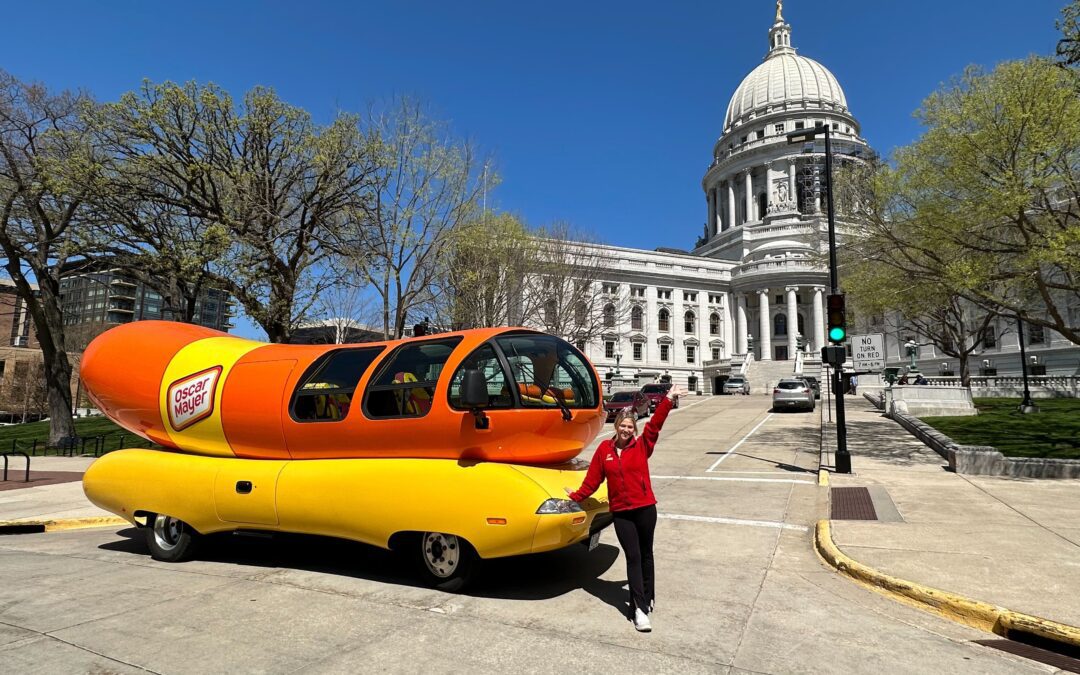
Experts blame Republican gerrymandering. We explain what it is, why it’s getting worse, and how you can help fix it this spring.
Wisconsin is the purplest of states. We have a Democratic governor and a Republican-controlled legislature. One Democratic senator and one Republican. Presidential elections come down to a fraction of one percentage point– mere thousands of votes.
But, despite all that, incumbent state legislators almost always win. Take the most recent election, for example: of the 86 Senate and Assembly races with an incumbent, only one lost. And in that case, Republicans drew former state Rep. Don Vruwink (D-Milton) into a different, more Republican-leaning district than the one that elected him in 2020.
Why? Gerrymandering.

Democracy, Defined
Gerrymandering is the practice of drawing the boundaries of electoral districts in a way that gives one political party an unfair advantage or reduces the voting power of a minority group.
While both parties have historically engaged in gerrymandering across the country, Republicans tend to exploit the process of redrawing political boundaries for partisan gain more than Democrats. The boundaries Wisconsin Republicans drew in 2011 and 2021 have been labeled “very shocking” in terms of the huge partisan advantage they gave them.
Packing is one way Republicans did this– by drawing districts that consolidate the population of an entire voting bloc into the smallest number of districts possible.
For example, because Republicans “packed” Democratic voters into Madison districts, which they drew into weird, puzzle-like shapes, they could put fewer Democratic voters in other districts– all but ensuring their right-wing colleagues would win re-election again & again.
The process makes districts safe not only for incumbent Republicans, but also for incumbent Democrats (although, fewer of them.) It’s like self-created job security by legislators, for legislators.

What’s Next
The upcoming spring elections could end that. The current maps were approved by the Wisconsin Supreme Court on a partisan 4-3 vote, with the court’s right-wing majority ruling in favor of Republicans and their gerrymandering.
This spring, one conservative-held seat on that court is open. And if a liberal candidate wins, that opens the door for rulings that favor more competitive maps in the future.
DID YOU KNOW? It hasn’t always been this way. In the past, the Wisconsin Supreme Court has refused to get involved in gerrymandering. The result was more competitive maps after federal courts oversaw the drawing of their lines.
The Bottom Line
Your voice and your vote are supposed to matter. But with gerrymandered maps, they often don’t.
Wisconsin’s upcoming Feb. 21 (primary) and April 4 (general) elections are possibly the last chance you have to ensure your vote will matter in the 2024 presidential election.
Click here to check your registration status today!

Support Our Cause
Thank you for taking the time to read our work. Before you go, we hope you'll consider supporting our values-driven journalism, which has always strived to make clear what's really at stake for Wisconsinites and our future.
Since day one, our goal here at UpNorthNews has always been to empower people across the state with fact-based news and information. We believe that when people are armed with knowledge about what's happening in their local, state, and federal governments—including who is working on their behalf and who is actively trying to block efforts aimed at improving the daily lives of Wisconsin families—they will be inspired to become civically engaged.


New Biden rules deliver automatic cash refunds for canceled flights, ban surprise fees
In the aftermath of a canceled or delayed flight, there’s nothing less appealing than spending hours on the phone waiting to speak with an airline...

One year on the Wienermobile: The life of a Wisconsin hotdogger
20,000+ miles. 16 states. 40+ cities. 12 months. Hotdogger Samantha Benish has been hard at work since graduating from the University of...

Biden makes 4 million more workers eligible for overtime pay
The Biden administration announced a new rule Tuesday to expand overtime pay for around 4 million lower-paid salaried employees nationwide. The...

‘Radical’ Republican proposals threaten bipartisan farm bill, USDA Secretary says
In an appearance before the North American Agricultural Journalists last week, United States Department of Agriculture (USDA) Secretary Tom Vilsack...





